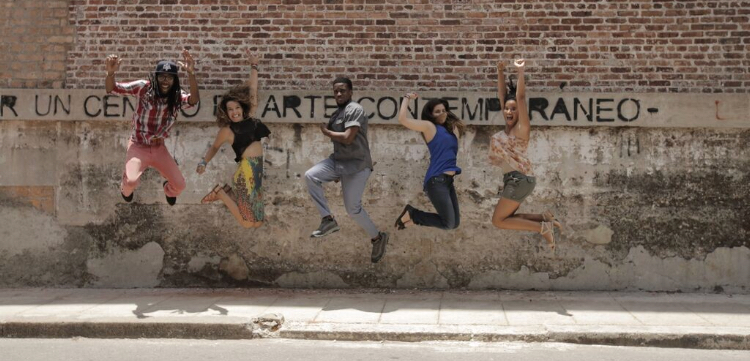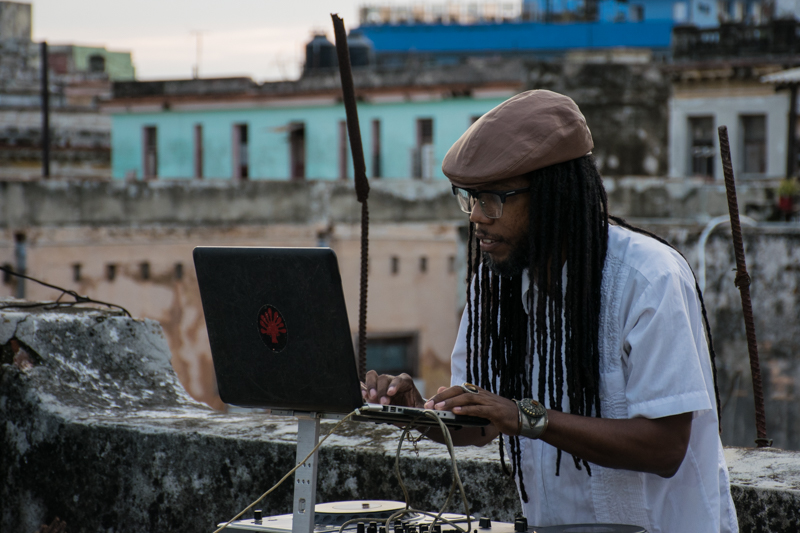In Guampara, Havana’s sounds of resistance find a home. The studio and record label is a consistent force in unearthing ways to maintain and honor the connection with Cuba’s past and its interconnected history with Africa, while also creating content that’s relevant to today. As label manager Laura Catana puts it, “It’s about staying rooted in the past while looking forward towards the future,” a mission she pushes with label founder and owner DJ Jigüe.
As we recently covered, AfroRazones, Guampara’s landmark compilation project this year, was a “Cuban manifestation of black resistance in 2017,” as described by the project’s Executive Director Luna Olavarría Gallegos. By bringing together 12 hip-hop, R&B, and spoken word artists in the booth, the project offered a Cuba-specific sample bank and an archive of transnational-rooted rhythms. It was the culmination of three days of media literacy workshops aiming to build sustainability for each artist involved, and also for the project itself.

This aspect of education is an ongoing tenet for Guampara; in Catana’s own words, “The lack of Internet access leaves Cuban artists at such a disadvantage because they don’t have the same opportunities to be exposed to what their peers in other countries are producing…we’ve got some upcoming projects that will offer more opportunities like this for Cuban artists.”
Guampara’s mission is not centered solely on connecting outwards, however; the project maintains an emphasis on educating the country’s artists and fortifying its homegrown scene. As a participant in this local community as much also being an organizer, Jigüe continues, “Our mission is to support the development of the scene of urban music in Cuba…to create cultural products that help to maintain our legacy, with a local eye toward our own roots and cultural heritage toward the future, with a contemporary language that can reach youth.”
While Guampara’s wheelhouse is musically rooted, it’s also extending into video documentation and videos, most recently fitted with a visual rendering of El Individuo’s powerful anthem “Mi Raza,” also from the AfroRazones project. The concept was developed by Eli Jacobs-Fantauzzi, who’s been a part of the Guampara team since its formation. Lensed by Cuban videographers Toussaint Avila Alvarez and Helman Avelle, and produced by Catana, the project was a collaborative effort, also integrating selections by El Individuo for the video’s religious imagery, like the palo fire rituals that were projected onto his skin during the shoot.
By wearing his pride quite literally, El Individuo’s message gets a visual accompaniment to the track’s mission of amplifying Black solidarity and reclaiming roots with pride. “This album is directed specifically toward the young Afro-Cuban audience, to show audiovisual codes as a way to translate a part of the message that’s within these linguistics,” Jigüe specifies. “The idea is to wake up the youth, to [direct them] towards the search of this information, to the search toward their roots, and to raise up the pride of being Afro-descendant in Cuban society.”

As director Jacobs-Fantauzzi explains, the complexity of an Afro-Cuban experience is difficult to melt down to one clip, but he was comforted by the final result. “We were able to create something that, whether the audience listens to the lyrics or speaks Spanish, they’ll be able to understand the message of the song and all of the sociocultural and political elements that are spoken about in ‘Mi Raza.’”
In strengthening this mission, Jacobs-Fantauzzi continues to innovate subversive ways to simultaneously educate and entertain audiences. He just finished editing the first cut of Bakosó, a project that Catana describes as “a documentary about the current day influence of Africa on Cuba, as seen through a genre of music that’s developing in Santiago de Cuba.” With DJ Jigüe’s influence on the national scene translated to a protagonist role in the documentary, the piece follows him as he travels to Santiago de Cuba to better understand the development of localized Afro-Cuban music traditions in a present-day context.

While Guampara maintains a clear intention to support Cuba’s scenes and artists, the label’s artists have also been enjoying opportunities to connect with like-minded artists off the island, especially energized by the recent social media literacy workshops. Three of the AfroRazones artists, El Individuo, Positivo Siempre, and Amehel Missión Raíz recently linked with the San Juan-based artists of ÌFÉ, who similarly celebrate their Afro-diasporic roots. They heard the group’s recording of “Tres Mujeres,” a track that resonated with the Guampara crew immediately. The fruition of this virtual link translated as “Tres Mujeres Havana Remix,” published as an official rework on ÌFÉ’s SoundCloud page, the result of a collaborative writing process, live percussion, and vocals recorded in Guampara’s studio, and DJ Lapiz mixing the track.
As Guampara’s profile continues to grow, so do the opportunities to amplify the label and crew’s mission outside of their tight-knit networks. Jigüe and El Menor have been invited to play at the WOMEX music conference this October in Poland, and will soon be releasing new material to accompany the tour. Two other Guampara artists, Kamerum, and Niño Fony, will also be releasing EPs that are wrapping up soon with Guampara. Catana describes Kamerum’s sound as a “mix somewhere between what he calls Afro-Cuban trap, R&B, and Caribbean reggae,” and Niño Fony has “more of a raggamuffin, dancehall kind of vibe, and his voice and flow is out of control.”
In continuing to create a home for musical output as much as education, by early 2018, Guampara will be opening Guampara 165, an “Afro-Cuban house of music and culture” designed to be a hub for travelers that are also interested in plugging directly into to the music and art community in Havana. Guampara 165 will offer customized experiences like workshops, educational activities, and access to the recording studio, as well as more traditional offerings like dance and percussion classes. While hiring local artists and musicians through Guampara 165’s programming, the project will also be donating a percentage of proceeds to support the local community. As Guampara’s visibility grows, so does their capacity to give back to the communities that these artist-activists have grown from.
Keep an eye close to Guampara’s output on their Facebook page for future manifestations of Afro-Cuban resistance.







